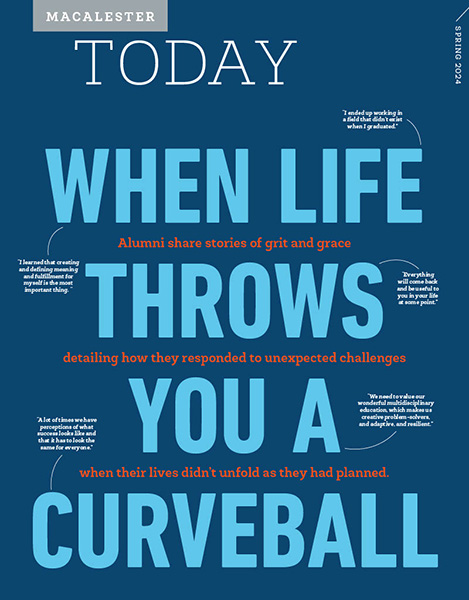
By Hillary Moses Mohaupt ’08 / Photo by Erica Dischino
In Clouded Waters, a new thriller by Dianna Hunter ’71, a lesbian Iron Range newspaper publisher in northern Minnesota fights to learn the truth about copper nickel mining in the region and tries to solve the disappearance of a local water scientist.
Although the Duluth-based writer’s novel is set in a fictional Minnesota town, the environmental, social, and political impacts the book explores are very real. Pro- and anti-mining residents continue to be fiercely at odds over proposed mining projects near the Boundary Waters Canoe Area (BWCA). The book’s plot is informed by aspects of Hunter’s own life and a call for justice that she honed at Macalester.
Raised in Minot, North Dakota, Hunter learned about Macalester from a recruiter who came to her high school. Her parents worked for the Great Northern Railway so she used to ride the train back and forth between Minot and St. Paul. She became a history major, and took as many journalism classes as the college offered.
Hunter remembers the moment during her junior year when she first discovered feminism thanks to conversations with her dorm’s resident assistant and her history professor Steve Trimble. After one such conversation about the injustice of male privilege, Trimble offered to lend her a copy of the new Redstockings Manifesto pamphlet. It detailed the ways in which women had been oppressed by men, and called for women, as a group, to develop consciousness-raising as a key tool for liberation from male supremacy.
“It opened me up to thoughts that have become essential in my life but which hadn’t even occurred to me, or to very many people in our culture,” she remembers now.
She began reading everything she could from the rising second wave of feminism, and then approached her advisor at the time, James Stewart, about pursuing a formal course of study. Stewart worked with her to create an independent study in fall 1970 that allowed her to delve deeper into radical feminist work. When that course ended, she applied to give an interim-term student-led course in January 1971, perhaps the first women and gender studies course at the college.
“We had some really formative discussions that changed our lives a lot,” she remembers. “It changed how we saw reality in a way that was very affirming and empowering for women who needed it very much at the time.”
After Macalester, she lived for a time on collective farms. “People were talking about self-sufficiency, growing our own wholesome food, and sidestepping materialism,” she remembers. It was important to her to find a community where she could build skills, raise feminist consciousness, and live as an out lesbian. “Living collectively takes commitment and follow-through to virtues like patience, care, and empathy,” she says now. Yet the reality was not without contradiction. Hunter is still grappling with the fact that the farms where she lived in Minnesota were only possible because white settlers had violently and systematically displaced local Indigenous people decades before and, more recently, struggling farmers had been pushed out by those with more money.
She went on to work as a dairy farmer, and, during the Reagan-era farm crisis, she helped local farmers understand their rights and protect their farms. She worked alongside farm activists Lou Anne Kling, who went on to become director of the federal Farm Services Administration, and Anne Kanten, who had been appointed Minnesota’s deputy commissioner of agriculture.
Hunter decided to document the movement by working with another writer to conduct oral-history interviews with lawyers, advocates, and farmers trying to survive. That collection, which she edited, became her first book, Breaking Hard Ground: Stories of the Minnesota Farm Advocates, published in 1990.
She says the Farm Advocate program helped her learn how to legally protect herself on her farm and help her community. That learning spilled over into writing, farming, and, lately, gardening and foraging. “I’m for work that’s trying to restore the world, work that makes it more equitable, safer, and more peaceful and fairer,” she says. “And that goes back to my Macalester days.”
In her forties, Hunter earned a master’s degree in English with an emphasis in creative writing from Iowa State University. She taught first-year comp at a number of institutions, then joined the University of Wisconsin-Superior to teach advanced writing classes and to run the university’s gender equity program.
She retired in 2012 and wrote a coming-of-age memoir about her collective farming days titled Wild Mares: My Lesbian Back-to-the-Land Life in 2018. Like Breaking Hard Ground, it was a finalist for a Minnesota Book Award.
In Clouded Waters, she was drawn to strong characters who are the story’s protagonists. “To be a strong character,” she explains, “means they are the one who’s telling the story, fully accepted and not seen as an exotic or a sidekick, but rather the person who’s at the heart of the story and who’s doing things to make the story happen.”
In many ways her characters reflect the essence of her time at Macalester, when she helped lead consciousness-raising discussions, sold feminist books in the student union, and found her own identity as a lesbian while teaching the interim course.
“I have a commitment to trying to support social justice and environmental justice and to be part of refreshing the earth, which seems to be in really mortal danger,” she says. “I think it’s the responsibility of all of us to fix that, if we can. It’s particularly the responsibility of writers, because it’s through stories that we learn what others are like. We learn some empathy in the process.”
Hillary Moses Mohaupt ’08 earned a master’s degree in public history and is a freelance writer in the greater Philadelphia area.
May 17 2024
Back to top





